Article 72: Coffee shops – mindfulness academies
Coffee shops have provided a cultural atmosphere that contributes most positively to intellectual stimulation, forging a sense of self to find the truth.
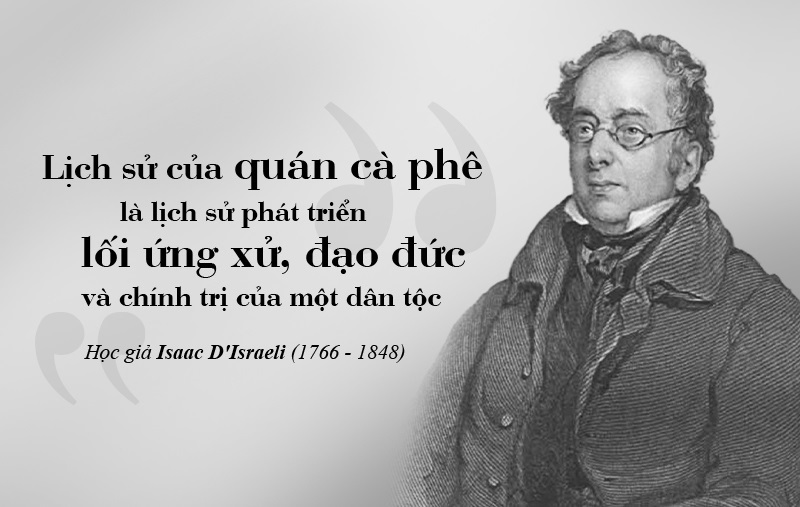
“The history of the coffee house is the history of the development of etiquettes, ethics and politics of a people.” Isaac D’Israeli (1766-1848)
Space for cultural and knowledge creation
In the mid-16th century, when coffee was already an essential drink in Ottoman social life, two Muslim merchants opened the first coffee shop in Constantinople. Since then, coffee shops have played the role of gathering and spreading coffee civilization, affecting all aspects of human life.
It is no coincidence that the first coffee shop was formed in Constantinople. Constantinople was the meeting point between East and West, Asia and Europe – the land that the ancient empires aspired to possess. Constantinople was once the capital of the Roman Empire, the Byzantine Empire, and by the mid-15th century, the Ottoman Empire. With a history spanning over so many empires, Constantinople is an extremely diverse city in terms of ethnicity, religion, and culture. Not to mention, traders from all over the world flock to develop many economic sectors.
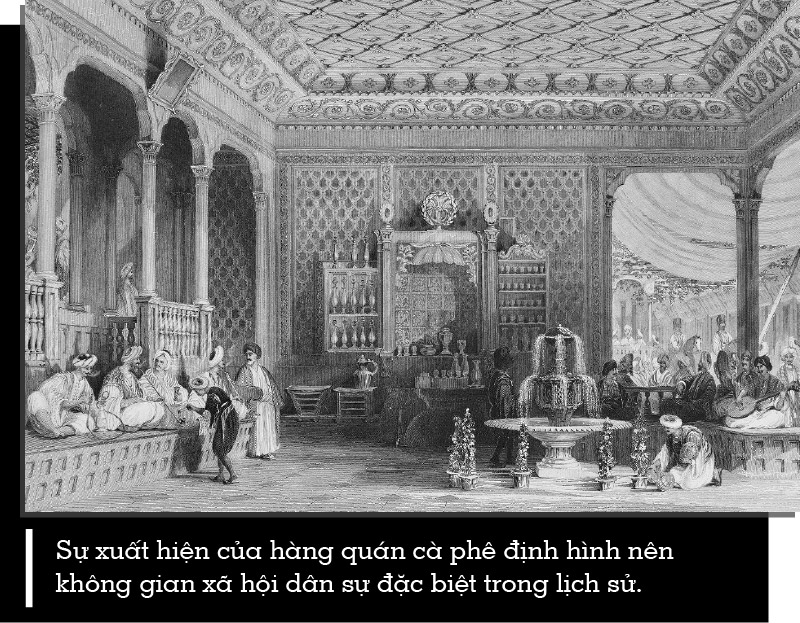
The emergence of coffee shops has shaped a historically special civil society space.
At this stage, the public space was only churches, bathhouses, and pubs. All three had certain limitations in connecting people with each other, because it did not break the differences in faith, class, ethnicity… Although they co-existed in an Ottoman empire, Muslims, Christians, Jews, Zoroastrians saw themselves as members of separate communities, living by different standards. If the church was the place of private practice of religions, the bathhouse divided the ranks and the pub was considered a taboo place by Muslims, the appearance of the cafe established a totally different experience space for “communication civilization”.
The early cafe was a large space with intricately carved bronze walls and ceilings. Single benches for guests to sit around the fountain located at the center of the room. The purpose of the cafe was to encourage strangers to sit close together. Therefore, coffee shops created an unprecedented social institution, where individuals of all religions, classes, professions, both literate and illiterate… unite in one space, talk and work together to discover limitless wisdom.
Originally, conversations were led by elites who had extensive knowledge, so the Ottoman cafe soon took shape as a center of public education (halk eğitim merkezleri), a school of knowledge (mekteb-i ‘irfan) or a reading house (okuma evi) that provided and disseminated ideas. Sitting down with a cup of coffee, scholars sharing new works, artisans performing, merchants looking for business opportunities, others coming to read books, or simply playing backgammon game – and taking pride because it was an intellectual game.
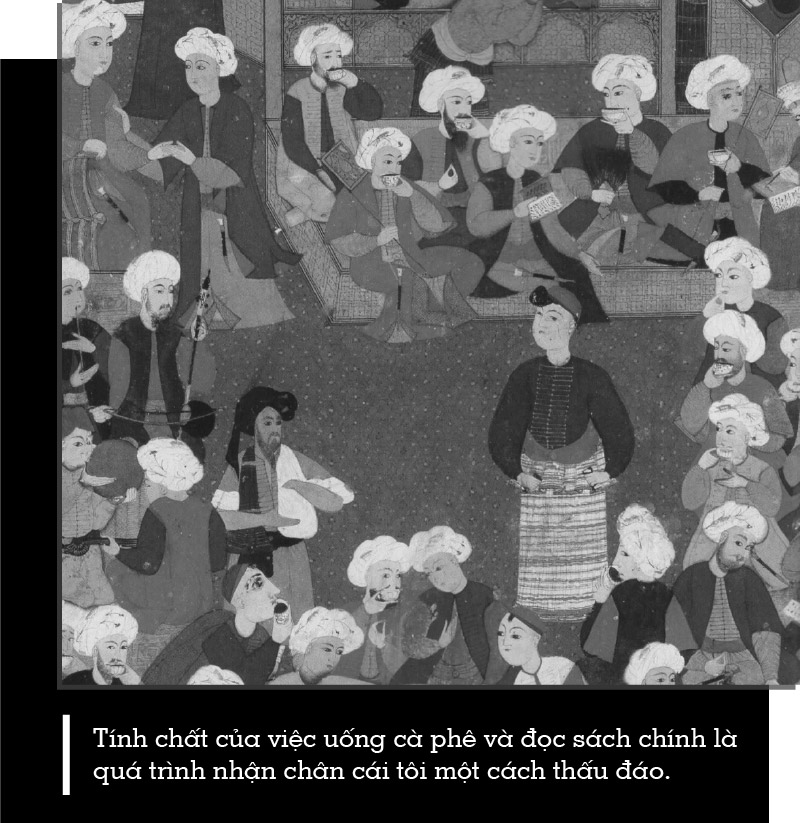
The nature of drinking coffee and reading books is the process of realizing the self thoroughly.
The spirit of learning and creativity was awakened, literary and artistic activities developed rapidly. Since the introduction of coffee and coffee shops in Ottoman society, a number of new concepts, idioms, and proverbs emerged. Countless folk poems, folk songs, rhymes, anecdotes were composed and popularized in the cafe. Art works were created from emotions when enjoying coffee and displayed at the cafe. The cafe was also a stage for musical performances, Karagöz (shadow play) and meddah (storytelling) performances…
During its heyday, coffee shops spread throughout the Ottoman Empire, even into remote villages. The type of coffee shop was also diverse in functions such as: indoor cafe, outdoor cafe, beach cafe, country cafe, summer cafe, mobile cafe… Citizens of the whole society participated in educational, economic and artistic activities.
As a cultural space, the space that awakened the thirst for knowledge had made the cafe basically one of the intellectual centers of the Ottoman Empire, playing an important role in the process of changing Ottoman cultural life.
The space awakening the desire to seek and share the truth
Coffee shops have been present throughout Europe since the middle of the 17th century, a period when European ideology and social norms changed above and beyond, also known as the Enlightenment age.
The coffee shop was involved in a historical milestone that permanently and positively changed the course of human development. This was the age of reason, the age of free, open, and inclusive debates on social issues. In the excitement of the boundless belief in human ability and intelligence, the coffee shop turned into the discourse of all the longings to commit to the common future of mankind.
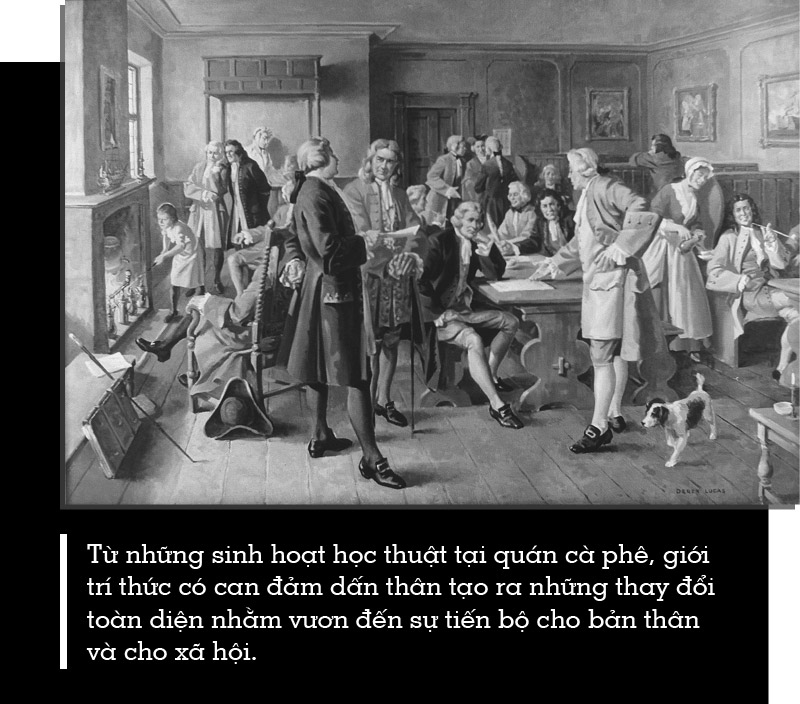
From the academic activities at the cafe, the intelligentsia had the courage to commit themselves to creating comprehensive changes for the betterment of themselves and the society.
In 1645, the first coffee shop opened in Venice, then in Oxford (1650), London (1652), Paris (1672) and Hamburg (1679). The coffee shop became the spiritual center of the Enlightenment era, disseminating ideals and knowledge to the whole society through unique intellectual activities.
The role of coffee was assessed by French historian – Jules Michelet (1798 – 1874) as “the elixir of mental clarity”. Coffee provided the energy and alertness needed for people with aspirations of the era to think clearly and work long hours. Therefore, the cafe gathered the most typical representatives of the Enlightenment movement across Europe such as: Immanuel Kant, Voltaire, Jean-Jacques Rousseau, Denis Diderot, d’Alembert, Isaac Newton, Hans Sloane, Edmund Halley… They discussed and wrote famous research works, radically affecting all fields, reshaping understanding of the world and about human life.
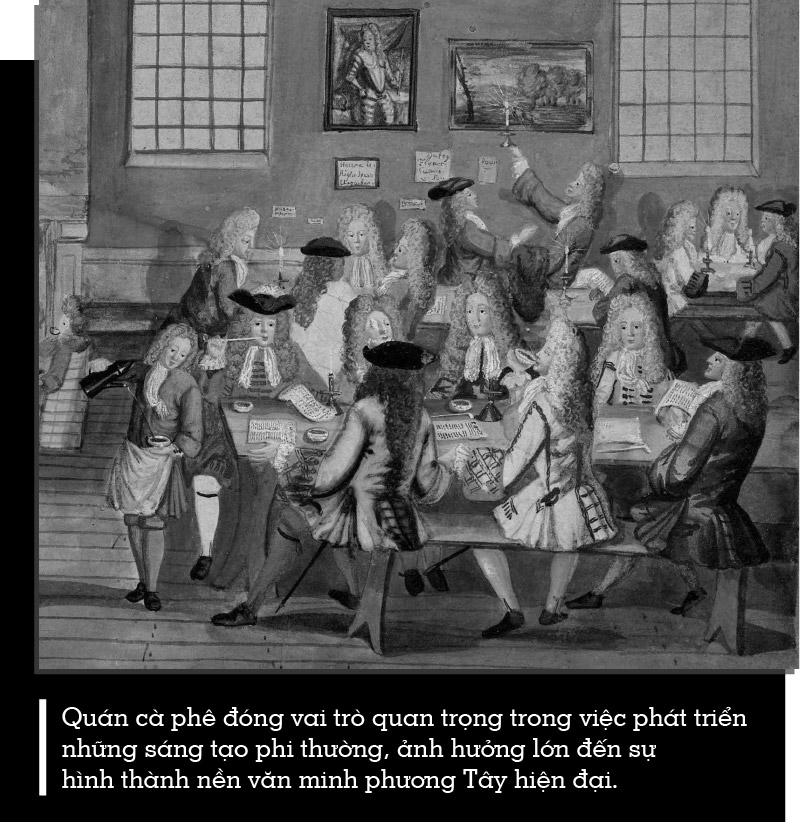
Coffee houses played an important role in the development of extraordinary creations that greatly influenced the formation of modern Western civilization.
Europe rose with the power of knowledge, and the light of that knowledge shone in the coffee spaces. The cafe was not only a place for discussion, but also for intellectual training as well as cultivating virtue through newsletters, newspapers, and books. This was the foundation for individuals to unleash their ability to reflect on themselves and the world around them, to bravely overcome all barriers to use reason to create new lives. At the same time, great thinkers no longer thought alone, they could bring ideas to the table. This intellectual gathering was the driving force of outstandingly progressive creations in politics, philosophy, science, economics, culture, etc., leading to the great development of social ideology and the formation of the modern Western civilization as we see it today.
Coffee shops bear the symbolic image of civilized progress, for one reason is that only in coffee shops can people have the strength to dare to voice their hopes and aspirations in life and be mindful enough to listen to others. From there, they can thoroughly understand their role in society and history to live for each other, to live for a happy life.
Since its inception, Trung Nguyen Legend Group has strived to perfect a comprehensive coffee ecosystem: Physical coffee – Spiritual coffee – Social coffee aiming to provide a new lifestyle – the Lifestyle of Wisdom, bringing authentin wealth and happiness to the human community. One of those efforts is shaping the creative spaces of coffee shops – where great souls converge.
In each space of the Trung Nguyen Legend Café, Trung Nguyen E-Coffee, Creative Space, Saturday Coffee, World Coffee Museum, Trung Nguyen Coffee Village, beside creative energy coffees, coffee lovers can also gain the power of knowledge from precious books in the Life Changing Foundational Bookcase, which was carefully selected by the Founder – Chairman of Trung Nguyen Legend Group, Dang Le Nguyen Vu, from millions of books, thousands of great and successful examples of mankind, helping each individual change his/her mind, forge great aspirations, shorten the path to success and true happiness.
THE REAL COFFEE
ROASTED ONLY FOR PEOPLE OF WISDOM!
Source: “The Philosophical Way of Coffee” – copyright by Trung Nguyen Legend


